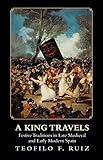A King Travels : Festive Traditions in Late Medieval and Early Modern Spain / Teofilo F. Ruiz.
Material type: TextPublisher: Princeton, NJ : Princeton University Press, [2012]Copyright date: ©2012Edition: Core TextbookDescription: 1 online resource (376 p.) : 4 halftones. 2 mapsContent type:
TextPublisher: Princeton, NJ : Princeton University Press, [2012]Copyright date: ©2012Edition: Core TextbookDescription: 1 online resource (376 p.) : 4 halftones. 2 mapsContent type: - 9780691153575
- 9781400842247
- HISTORY / Europe / Spain & Portugal
- Alfonso XI
- Carnival
- Catholic devotional cycle
- Christians
- Corpus Christi
- Crown of Aragon
- Ferdinand III
- Fernando of Antequera
- Guadalquivir
- Iberian festivals
- Islamic Spain
- Moors
- Philip II
- Seville
- Spain
- Spanish celebrations
- Spanish culture
- Spanish festivals
- Spanish influence
- Spanish politics
- Western Europe
- artificial warfare
- authority
- baldachin
- birth
- celebrations
- celebratory cycles
- ceremony
- chivalrous activities
- chivalrous literature
- church ceremonies
- coming of age
- contestation
- coronation
- courtly culture
- courtly literature
- cultural performances
- death
- eastern kingdoms
- festivities
- fictitious battles
- fictitious combat
- formal entry
- ideological purposes
- juego de caas
- kingly hegemony
- life cycle
- ludic events
- marriage
- martial displays
- martial festivals
- medieval festivals
- mock warfare
- multivocal performances
- noncalendrical celebrations
- palio
- political performances
- political realities
- political shifts
- power
- princely entry
- princely power
- reception
- regal procession
- resistance
- ritual making
- royal entries
- royal entry
- social meanings
- social relations
- subversive themes
- tournament
- tournaments
- transgressive behavior
- triumphal entry
- 394.26946 23
- GT4862.A2 R85 2012eb
- online - DeGruyter
- Issued also in print.
| Item type | Current library | Call number | URL | Status | Notes | Barcode | |
|---|---|---|---|---|---|---|---|
 eBook
eBook
|
Biblioteca "Angelicum" Pont. Univ. S.Tommaso d'Aquino Nuvola online | online - DeGruyter (Browse shelf(Opens below)) | Online access | Not for loan (Accesso limitato) | Accesso per gli utenti autorizzati / Access for authorized users | (dgr)9781400842247 |
Frontmatter -- Contents -- Preface -- Abbreviations -- CHAPTER I. Festivals in Late Medieval and Early Modern Spain: An Introduction -- CHAPTER II. The Meaning of Festivals: A Typology -- CHAPTER III. Royal Entries, Princely Visits, Triumphal Celebrations in Spain, c. 1327-1640 -- CHAPTER IV. The Structure of the Late Medieval and Early Modern Royal Entry: Change and Continuity -- CHAPTER V. A King Goes Traveling: Philip II in the Crown of Aragon, 1585-86 and 1592 -- CHAPTER VI. Martial Festivals and the Chivalrous Imaginary -- CHAPTER VII. Kings and Knights at Play in Late Medieval and Early Modern Spain -- CHAPTER VIII. From Carnival to Corpus Christi -- CHAPTER IX. Noncalendrical Festivals: Life Cycles and Power -- Conclusion -- APPENDIX. The Feasts of May 1428 at Valladolid -- Bibliography -- Index
restricted access online access with authorization star
http://purl.org/coar/access_right/c_16ec
A King Travels examines the scripting and performance of festivals in Spain between 1327 and 1620, offering an unprecedented look at the different types of festivals that were held in Iberia during this crucial period of European history. Bridging the gap between the medieval and early modern eras, Teofilo Ruiz focuses on the travels and festivities of Philip II, exploring the complex relationship between power and ceremony, and offering a vibrant portrait of Spain's cultural and political life. Ruiz covers a range of festival categories: carnival, royal entries, tournaments, calendrical and noncalendrical celebrations, autos de fe, and Corpus Christi processions. He probes the ritual meanings of these events, paying special attention to the use of colors and symbols, and to the power relations articulated through these festive displays. Ruiz argues that the fluid and at times subversive character of medieval festivals gave way to highly formalized and hierarchical events reflecting a broader shift in how power was articulated in late medieval and early modern Spain. Yet Ruiz contends that these festivals, while they sought to buttress authority and instruct different social orders about hierarchies of power, also served as sites of contestation, dialogue, and resistance. A King Travels sheds new light on Iberian festive traditions and their unique role in the centralizing state in early modern Castile.
Issued also in print.
Mode of access: Internet via World Wide Web.
In English.
Description based on online resource; title from PDF title page (publisher's Web site, viewed 29. Jul 2021)


